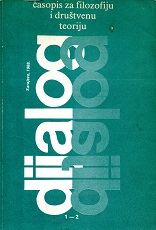Jedna hipotetička skica socijalne strukture jugoslovenskog društva
A HIPOTETICAL FRAME THE SOCIAL STRUCTURE OF YUGOSLAV SOCIETY
Author(s): Besim IbrahimpašićSubject(s): Economic history, Political history, Post-War period (1950 - 1989)
Published by: Akademija Nauka i Umjetnosti Bosne i Hercegovine
Summary/Abstract: In this study, the author endeavours to give the social structure of Yugoslav socialist society after 40 years of major political, economic, social and class changes that occured from 1945 to 1985. Yugoslav society prior to the World War II was semi-agricultural with underdeveloped industry. The majority of population were peasants (75—8O%), whereas working class and inteligentsia made a small percentage. Bourgeoisie was not as rich and powerful as in the developed countries. Due to this social structure, the liberation war in Yugoslavia had all the elements of social revolution, primarily peasant revolution, organised and lead by the Communist Party of Yugoslavia. Hence all the problems that occured after the war, in the transformation of the society that called itself socialist and strived for industiralization. The author is of opinion that great results were achieved and significant changes took place in the social structure of Yugoslavia, i. e. in 1985, the percentage of peasants decreased to 19*/®. Nevertheless this was a mechanical flow of labour from country to the cities, where the process of rapid industrialization was taking place. Peasants became working class, and opposed to them there is no private ownership but government apparatus, as an absolute owner of allthe means, or in the later period, the so-called polit-bureaucracy as a class raised as a political governing elite in spite of self-management. Therefore, it can be said that the basic social classes are: new heterogeneous working class, mostly of peasant origin with tight bonds with their native places and with all their agricultural habits; technical inteligentsia, social science inteligentsia whose traditional position as a respected and privileged class has been deminished and degraded. This class recruits the largest number of so-called »dissidents « and »opponents« to a newly formed governing class, which could be called »politocracy«. This class is strictly hierarchicaly organised, and in spite of all selfmanaging democratic phraseology, it does not whish to give up the monopoly of power and all their legal and illegal privileges, obtained in its long range rule. Nevertheless, this class is susceptible to various »purges« depending on changeable and unforscable political events on the international and local political scene. The author does not think that a new class exits, while public property, in spite of all present limitations and misuses, is a good economic foundation for a possible more just social system in which people will obtain a better position exclusively based on their work and abilities.
Journal: Dijalog - Časopis za filozofiju i društvenu teoriju
- Issue Year: 1988
- Issue No: 01+02
- Page Range: 159-172
- Page Count: 15
- Language: Bosnian

